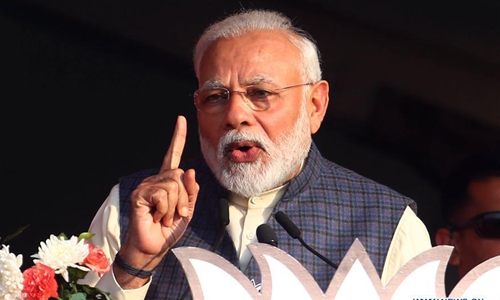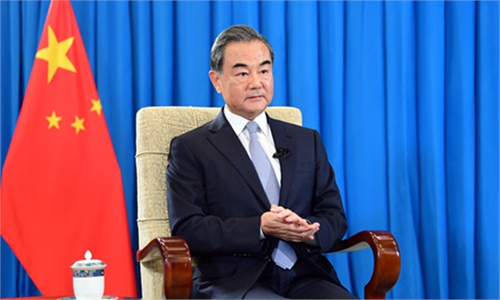
Indian Prime Minister Narendra Modi addresses his Bharatiya Janata Party's campaign rally in support of East Delhi candidates ahead of Delhi state elections in Delhi, India, Feb. 3, 2020. (Xinhua/Partha Sarkar)
India is planning to host the 2023 meetings of the G20 in Jammu Kashmir, the Indian Express reported in late June. India's objective in doing so is clearly to force the international community to recognize India's control and even "sovereignty" over Jammu Kashmir, the disputed region between India and Pakistan. Involving Jammu Kashmir in such an important international conference could also be claimed as a diplomatic victory for the ruling Bharatiya Janata Party (BJP) of India and is supposed to bring a boost to its domestic support.Arguably, India's move was driven more by its domestic politics, which in 2019 motivated the BJP to revoke autonomy of Jammu Kashmir granted under Article 370 of the Constitution of India. The region has since been administered as a "union territory" after the Jammu and Kashmir Reorganization Act, 2019 took effect from October 2019. Such operations are all aimed at highlighting the nationalist identity of the BJP, as a representative of Hindu interests.
The rise of Hindu nationalism is behind the growing influence of the BJP in India over the past decade, which has gradually become the dominant party. Therefore, in order to attract the support of the largest number of Hindu voters, the Modi government has never hesitated to change the situation in Jammu Kashmir, provoking religious strife and suppressing the Muslim population, which further intensified India's domestic sectarianism and populism.
In addition, the conflict between India and Pakistan has attracted close international attention after India abrogated the special status of Jammu Kashmir, causing strong resentment from Pakistan while sparking uproar across the Muslim world. Most Muslim countries have expressed support for Pakistan on Jammu Kashmir, and the anti-Muslim actions of the BJP after coming to power have triggered formal diplomatic protests from many Muslim countries. In response, it's necessary for the Modi government to pacify these unfavorable public opinions.
As a result, if the G20 members acquiesce in India's efforts to hold some meetings of the 2023 summit in the disputed region, it will be a diplomatic "bonus" for the Modi government and a confirmation of its foreign policy based on domestic demands.
The Jammu Kashmir government has constituted a five-member committee for overall coordination of G20 meetings, the process of which has commenced. But for now, it seems that Delhi is just throwing out the tentative question of simply whether the meetings can be held in the region, but it remains unclear if those meetings will eventually take place in Jammu Kashmir.
It has been three and a half decades that no major international summit was held in Jammu Kashmir, and the G20 has never held a major event in disputed regions since the forum began to convene at least once a year in 2008. India's desire to hold meetings of the high-profile summit there is probably wishful thinking and is bound to be highly controversial, since the world's largest Muslim country Indonesia is included in the G20.
There has been a series of resolutions for Jammu Kashmir made by the United Nations Security Council, and bilateral documents signed by India and Pakistan. China's position is the same as that of the vast majority of countries, hoping that the two sides will properly resolve the issue on the basis of the relevant UN resolutions. For such a disputed area, unilateral actions taken by India are unjustified and will stimulate the escalation of the dispute, and even confrontation, which is obviously contrary to the consistent purpose of the UN and the spirit of relevant resolutions on Jammu Kashmir.
Since the independence of India, the situation in India-held Jammu Kashmir has been filled with tension. Clashes between the Muslim-majority local population and the authorities break out from time to time. The process of political normalization is slow, people are poor, and social development is lagging behind other areas. The Indian government, instead of improving local people's living standards and resolving problems that threaten local people's survival, is seeking endorsement of world's major economies on the disputed territory by taking advantage of India's upcoming G20 presidency. It is politicizing multilateral platforms like G20, further complicating India-Pakistan disputes. This should not be tolerated by the international community.
The Kashmir issue, a dispute left from the past, should be peacefully and properly addressed in accordance with the UN Charter, Security Council resolutions and bilateral agreement. The parties concerned need to avoid unilateral moves that may complicate the situation. Efforts should be made to settle the dispute through dialogue and consultation so as to maintain regional peace and stability.
The author is director of the research department at the National Strategy Institute at Tsinghua University. opinion@globaltimes.com.cn

